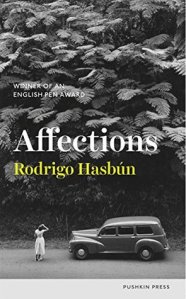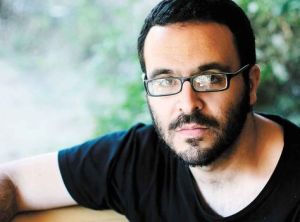 Selected in 2010 as one of The Best of Young Spanish Language Novelists by Granta, Bolivian author Rodrigo Hasbún’s Affections is his second novel and will be published in ten languages. It was the winner of an English PEN Award 2016.
Selected in 2010 as one of The Best of Young Spanish Language Novelists by Granta, Bolivian author Rodrigo Hasbún’s Affections is his second novel and will be published in ten languages. It was the winner of an English PEN Award 2016.
The novel is less a story and more a set of loosely connected vignettes from the lives and perspectives of the three daughters of Aurelia and Hans Ertl, a family who fled post-war Germany in the wake of their father’s position as a cameraman, (he had worked on several Nazi propaganda films), to live in exile in Bolivia.
One of his daughters Monika Ertl became involved with the survivors of Che Guevara’s guerrilla movement and was allegedly involved in the assassination of the Bolivian consul in Hamburg, a man said to have ordered the hands of Guevara be cut off and sent to La Paz.
Hasbún’s novel takes these threads and weaves a disparate narrative, that highlights different moments in the lives of all members of this family, whose life trajectory was dramatically altered by their geographic displacement.
No sooner have they arrived, than Hans, a climber, explorer, photographer, seeker of adventure announces he is quitting climbing and organising an expedition to find a lost Inca city named Paititi buried somewhere deep in the Amazon forest. Two of his daughters come with him, and for his eldest Monika, it becomes a first step towards a life of social activism, which will result in her involvement in revolutionary guerilla warfare.
With a father seeking adventure and a mother prone to melancholy, the girls find themselves in a place they can never truly call home, where they will always be viewed as outsiders and find it difficult to find solace even among their ex-pat community, which in a cruel twist of fate, view them similarly to the way they were regarded in post-war Germany, only now it seems futile to escape their fate.
“All that grind to end up back where I started,” he complained to me one day down the phone. He said he’d experienced something similar after the war, that they’d already made him feel like an outcast once before, that during that period they closed one door after another to him, but that this time he wouldn’t move an inch.
Also included in the narrative are what appear to be the responses to an interview or interrogation of one of Monika’s lovers Reinhard, who was her brother-in-law, probably in a follow-up to the assassination of the Bolivian consul.
//yes, she’s the only one who matters now, the misunderstood child, the chaotic, rebellious teenager, the woman who went on to lose all perspective and no longer knew where to stop and ended up hurting herself and others. //Yes, if you pressed me I would say this is the definition of her that sticks: the woman who went on to cause so much hurt.

Bolivian Author, Rodrigo Hasbún
It is a fragmentary novel that depicts a family set adrift, unable to remain united nor to be held together by their adopted community, the daughters seek to carve out a life of their own, struggling in isolation.
The piecemeal structure of the novel with its alternating narrators is symbolic of that disconnect and isolation, exile may have heralded adventure and discovery, however the expedition to discover a lost city, became the catalyst to the disintegration of all that once kept them together.
It’s not true that memory is a safe place. In there too, things get distorted and lost. In there, too, we end up turning away from the people we love the most.
Note: Thank you to the publisher Pushkin Press for a copy of this haunting novella.
Further Reading
The City and the Writer: In Cochabamba with Rodrigo Hasbún – an interview by Nathalie Handal.

I liked this too, and I thought the unusual form of the narrative worked really well for the kind of story it was.
LikeLiked by 1 person
I thought it held together well, apart from occasionally not being sure which sister was narrating. I like these kind of stories that prompt us to become informed about people and passages of time, sad that exile as the catalyst to their growing apart, and couldn’t help but feel that losing a mother, often has that effect, the cornerstone of family.
LikeLiked by 1 person
I completely agree with your comments on the structure of the book being a reflection of the sense of dislocation and disparate nature of Ertl’s family. An intriguing story on many different levels. Glad you enjoyed it, Claire.
LikeLiked by 1 person
Thanks to your review for bringing this one to my attention Jacqui, intriguing and rather sad that their efforts to achieve something notable were so skewered.
LikeLike
This sounds so intriguing. I’ll look it out.
LikeLiked by 1 person
Thanks Margaret, it’s quite a quick read.
LikeLiked by 1 person
I’ve heard nothing but good about this. It does sound haunting, as you say. I’ll have to seek it out.
LikeLiked by 1 person
And unique to have come across an author from Bolivia, I think that’s a first for me, I had no idea it was a destination for exiles, though not surprising given the father’s interest in climbing, it’s certainly a destination for keen alpinists.
LikeLiked by 1 person